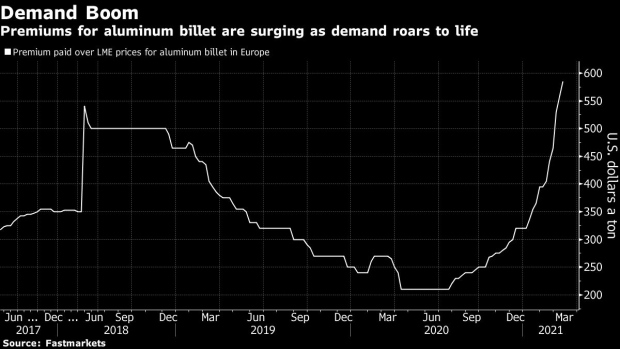Mar 26, 2021
Suez Risk Comes at Bad Time for Unusually Tight Aluminum Market
, Bloomberg News

(Bloomberg) -- The Suez Canal blockage is threatening to intensify a rare shortage of aluminum products crucial to the transport and construction industries.
As factory output surges in Europe and industrial buyers restock ahead of lockdown restrictions easing, supplies of specialist products like aluminum billet are tightening quickly. That’s helped push benchmark aluminum prices near the highest since mid-2018.
Several Middle Eastern suppliers including Emirates Global Aluminium and Aluminium Bahrain BSC are specialists in the sector, and while there’s no sign of any significant aluminum hold-ups in the Suez queue, flows to Europe would be at risk if the blockage drags on. Dislodging the stranded Ever Given may take until at least Wednesday.
Short-term freight disruptions typically aren’t an issue in the well-supplied aluminum market, but the scramble for aluminum products in Europe has sent shipping premiums paid by consumers surging. Market observers say that the Suez crisis could worsen the situation.
“It’s a little bit of a frenzy,” Kamil Wlazly, a senior metals analyst at Wood Mackenzie, said by phone from London. “There are much more important things going on than the Suez canal blockage -- it’s just one more issue.”
Billet buyers in the U.S. are facing a similar shortage, while in top consumer China, government emissions regulations targeting key producers have drastically altered assumptions about supply.
Aluminum in Shanghai rallied to the highest level in almost a decade earlier this month as China’s green push was considered a “game changer” for the long-term outlook after years of gluts in the industry. Prices have eased this week after the nation was said to consider selling about 500,000 tons from state reserves to cool the market.
Aluminum rose 1.7% to $2,283 a ton by 12:40 p.m. on the London Metal Exchange, while Shanghai futures closed 2.1% higher. In other LME metals, copper climbed 1.6% to $8,923 a ton and zinc rose 1.6%, both trimming weekly losses.
©2021 Bloomberg L.P.


